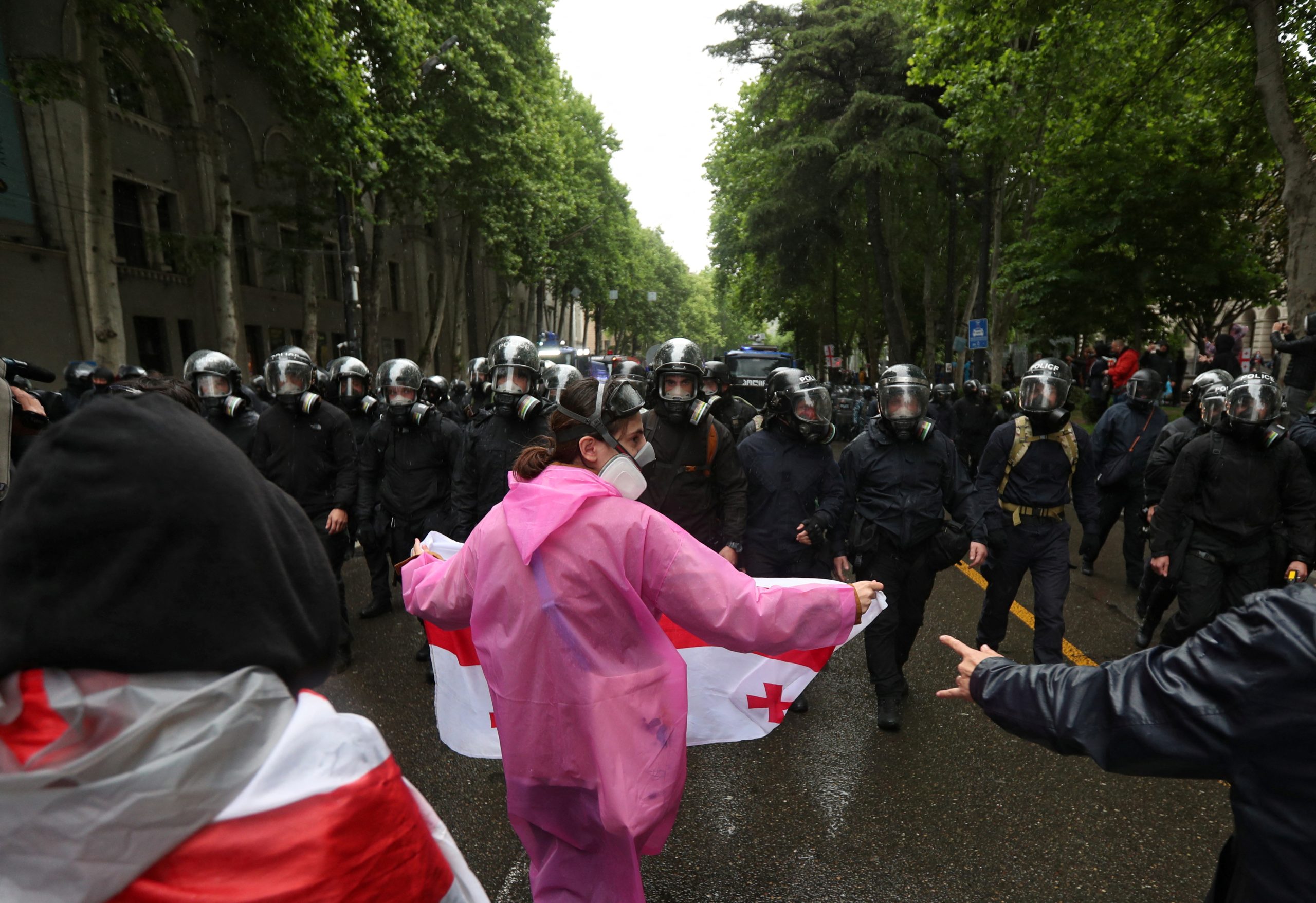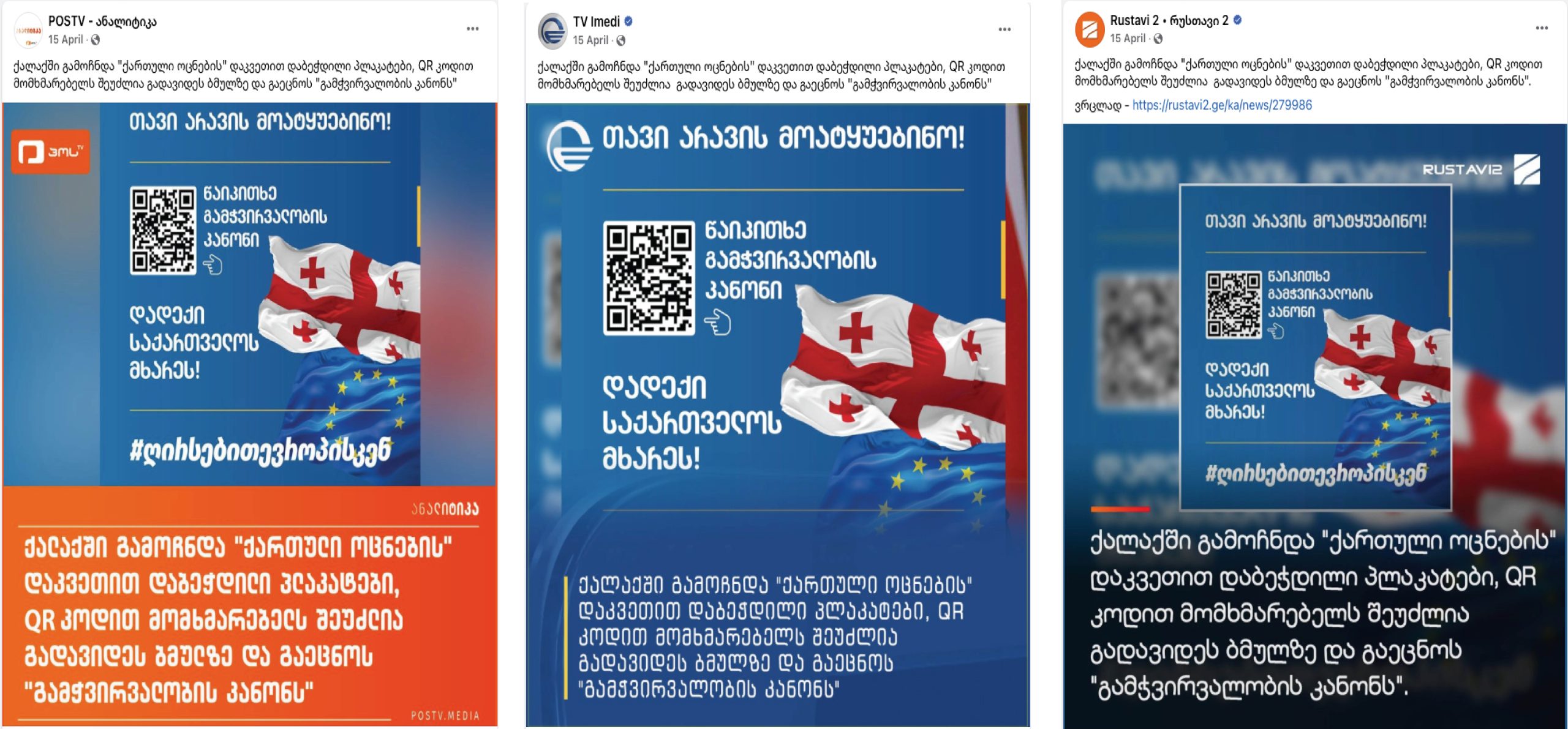How mainstream Georgian media shaped perceptions of the foreign agent law protests
Georgian media promoted opposing views, with TV channels critical of the law outperforming pro-government channels
How mainstream Georgian media shaped perceptions of the foreign agent law protests
Share this story

BANNER: A demonstrator holds a Georgian flag during a rally to protest against a bill on “foreign agents” in Tbilisi, Georgia on May 14, 2024. (Source: Reuters/Irakli Gedenidze)
Amid widespread protests in Georgia this spring against the foreign agents law, reporting by pro-government and opposition mainstream media diverged significantly, with opposition media coverage outperforming pro-government media when it came to online engagement. In this piece, the DFRLab sought to understand how mainstream TV channels shaped public perceptions of the law.
On April 3, 2024, the Georgian Dream party re-introduced a bill obliging media and civil society organizations receiving at least twenty percent of funding from abroad to register as “foreign agents.” Despite harsh criticism of the law by Western partners, who argued the law would undermine Georgia’s European Union (EU) integration process, the Georgian Dream party voted to override President Salome Zourabichvili’s veto and adopted the law on May 28, 2024. As a result, the United States imposed travel bans on “dozens” of Georgian Dream officials and their family members for being “complicit in undermining democracy in Georgia.”
The mainstream media environment in Georgian exhibits a dichotomous nature, with news coverage reflecting the country’s divisive political system and media organizations aligning themselves with existing political parties. This media environment both results from and contributes to polarization. A 2023 study conducted by researchers at Ivane Javakhishvili Tbilisi State University indicates that mainstream Georgian TV stations provide conflicting interpretations of political events. Another study conducted by Deutsche Welle in the same year found that 70 percent of the Georgian population believes local news coverage lacks objectivity. This is noteworthy as a reported 84 percent of Georgians receive their news from TV broadcasters, and 72 percent receive their news from social media. Amid the protests against the foreign agents law, the DFRLab analyzed how mainstream media framed the law and the protests. In the absence of recent broadcast viewership data, we reviewed Facebook content published between April 3 and May 31 from pro-government TV stations (TV Imedi, PosTV, Rustavi 2) and TV stations critical of the government (Mtavari Arkhi, Formula, TV Pirveli). We also examined the Facebook engagement and website traffic of these TV channels.
Framing of protests
The examined TV stations shared opposing perspectives regarding the protests, the law, and the possible consequences of its adoption. Pro-government media sought to discredit the protests and framed the law as being necessary to promote transparency. In contrast, critical and opposition TV stations provided detailed coverage of the protests and shared negative opinions about the law.
The TV channels critical of the government were key in promoting the protests, aiding civil activists in disseminating information and logistics about the demonstrations. The channels also covered statements critical of the law originating from Western partners. The coverage from these stations referred to the foreign agents law as the “Russian law,” a term that gained traction in 2023 due to the foreign agents law’s similarity to a law that exists in Russia. Coverage of the demonstrations openly criticized the law and featured captions like “No to Russian Law!” or “No to Russian regime.” In examining 3,020 Facebook posts from opposition broadcasters containing the keywords “Russian” and “law,” 1,576 posts included the protest slogan “No to Russian law.” The Facebook page of the critical Mtavari TV also used Russian flags and Kremlin images in the background of their images when reporting on the Georgian Dream’s effort to pass the law.

In contrast, pro-government media did not refer to the law as the “Russian law” and instead consistently described it as the “Georgian law” or the “law on transparency.” These TV channels often quoted ruling party politicians who argued the law serves Georgian interests and is essential for ensuring transparency. In response to the slogan “No to Russian law,” pro-government TV channels amplified statements from Georgian politicians promoting the slogan “Yes to Georgian law.” When the EU criticized the law, describing it as incompatible with European values, pro-government TV channels promoted statements from Georgian Dream members that asserted the law was European because it aligned with the fundamental European value of transparency. Additionally, some TV channels aired statements that suggested the law was one of the EU’s recommendations for Georgia’s integration. The DFRLab also identified posts published on April 15 by POSTV, TV Imedi, and Rustavi 2 with identical captions, encouraging people to scan a QR code that led to the full text of the “law on transparency.”

To undermine the validity of the protests, pro-government TV channels depicted the demonstrations as violent and organized by “radical” groups, including opposition parties. They claimed protesters attacked the police and that the “violent protests” were orchestrated by a “political minority.” However, during the demonstrations, which were organized by individuals and not political parties, it was Georgian police that used excessive force against protesters. Pro-government channels reported on a statement by Prime Minister Irakli Kobakhidze that asserted the “radical opposition” was behind the protests. Additionally, pro-government commentator Levan Nikolaishvili claimed on TV Imedi that the US Embassy in Georgia had instructed opposition leaders on how to conduct more “radical protests.” Some statements from politicians affiliated with the ruling party, broadcast by these TV channels, argued that the protest organizers were using young people to incite a “bloody revolution” and claimed that the presence of young people at the protests was dangerous for their health.
Pro-government TV channels also engaged in smear campaigns and spread disinformation to discredit the protests. Meanwhile, opposition media outlets portrayed the demonstrations positively, describing them as the “students’ protests,” “march for Europe,” and “march for Freedom. The Facebook pages of Mtavari TV and TV Pirveli labeled a Georgian Dream-organized demonstration on April 29 as the “Russian March.” Critical broadcasters also provided coverage of anti-government protests organized by the Georgian diaspora in various Western cities and offered extensive information and legal advice on police interactions aimed at protecting activists arrested or summoned for interviews.

Pro-government TV channels depicted anyone opposing the law as being against Georgia’s sovereignty and independence. When opponents of the law organized a march on April 9, TV Imedi claimed they were fighting “against the transparency and independence of Georgia.” These channels also aired statements from Georgian Dream politicians asserting that opponents of the law were fighting for “black money” while the ruling party was fighting “for strengthening the quality of Georgia’s sovereignty and independence.” In contrast, the critical TV channels amplified statements from Western leaders that indicated the Georgian Dream party was turning away from Georgia’s EU aspirations, warned of potential sanctions, and asserted that the foreign agents law was incompatible with Georgia’s path to EU integration.
Engagement and interaction
On Facebook, opposition TV channels published a higher frequency of posts and garnered more engagement than pro-government media outlets. The critical TV channels referred to the law as “Russian” in over 3,000 posts between April 3 and May 31, 2024, garnering over 900,000 engagements. In contrast, pro-government TV channels mentioned the law in the context of transparency more than 320 times, with those posts receiving over 353,000 engagements. The DFRLab identified eighty-two posts from pro-government media portraying the protests as violent and/or organized by “radicals,” while critical channels published 372 posts about the protests being organized by young people and students. Additionally, 391 posts from pro-government channels discussed the law as enhancing Georgia’s sovereignty and independence, attracting over 280,000 engagements. Conversely, 983 posts from critical TV stations argued that the law could undermine Georgia’s EU aspirations, with these posts receiving over 330,000 engagements.
Pro-government TV channels promoted their content on Facebook via ads, whereas critical channels published no ads between April 3 and May 31. The pro-government TV Imedi, POSTV – ახალი ამბები (“POSTV – NEWS”), and POSTV – ანალიტიკა (“POSTV – Analytics”) published more than 1,800 ads. The DFRlab previously reported on how pro-government pages, including those of TV Imedi and POSTV, used Facebook ads to spread disinformation to attempt to discredit the protests.
A CrowdTangle analysis showed a significant surge in engagement with content from the critical TV stations amid the protests. From April 3 to May 4, critical TV channels accumulated more than 14.2 million engagements, while pro-government channels received 7.4 million. The critical channel Mtavari Arkhi exceeded 2 million interactions between April 24 to May 4, while TV Pirveli received the second-highest engagement during this period. Between January 1 and April 3, before the law’s reintroduction, the critical TV channels received 5 million engagements, and the pro-government channels received 4.6 million. This indicates that critical TV channels received 9 percent more engagement than the pro-government channels before the law, but this gap widened to 91 percent more engagements in the two months following the law’s introduction, showing an increased interest in content from critical TV stations.

Websites
The DFRLab analyzed web traffic for the three critical media outlets and two of the pro-government media outlets, excluding POSTV due to the inactivity of its website. Using Similarweb, we compared the performance of mtavari.tv, tvpirveli.ge, formulanews.ge, imedinews.ge, and rustavi2.ge from February to April 2024.
In the country rank metrics, which Similarweb defines “by the highest sum of monthly unique visitors and page views,” the websites of the three critical outlets occupied the top three places. Mtavari.tv ranked first, followed by formulanews.ge, and tvpirveli.ge. Pro-government imedinews.ge ranked fourth, and rustavi2.ge ranked fifth. In terms of total visits between February and April 2024, mtavari.tv’s website held the first position with nearly 700,000 visitors. Pro-government Imedinews.ge occupied the second position, with nearly 480,000 visitors, 1.4 times fewer visitors than Mtavari. The websites tvpirveli.ge and formulanews.ge ranked third and fourth with nearly 440,000 and 436,000 visitors, respectively. Rustavi2.ge ranked last with nearly 415,000 visitors.

The traffic performance of the selected websites remained relatively stable between February 1 and April 9. However, a significant shift occurred from April 10, when public outcry around the law intensified. Visitors to all five websites grew, indicating a heightened interest in the content. Notably, mtavari.tv outperformed the remaining four websites, experiencing a surge of 139,000 visitors between April 25 and April 30. In comparison, rustavi2.ge received 48,000 visitors during the same period, ranking the lowest among the websites of pro-government TV channels.

The polarization of Georgian media is reflected in how both groups of channels constructed opposing narratives. The critical TV channels outperformed the pro-government channels when examining social media engagement, website traffic, and overall public interactions during the protest period. This higher engagement suggests that the narrative pushed by these outlets resonated more with the general public, particularly during the protests. Pro-government TV channels, despite being well-resourced and running paid ads, garnered less engagement compared to their critical counterparts. Their framing of the law as essential for “national sovereignty” and “transparency” did not appear to resonate as strongly with viewers.
Cite this case study:
Sopo Gelava, Givi Gigitashvili and Esteban Ponce de León, “How mainstream Georgian media shaped perceptions of the foreign agent law protests,” Digital Forensic Research Lab (DFRLab), November 4, 2024, https://dfrlab.org/2024/11/04/how-mainstream-georgian-media-shaped-perceptions-of-the-foreign-agent-law-protests.

